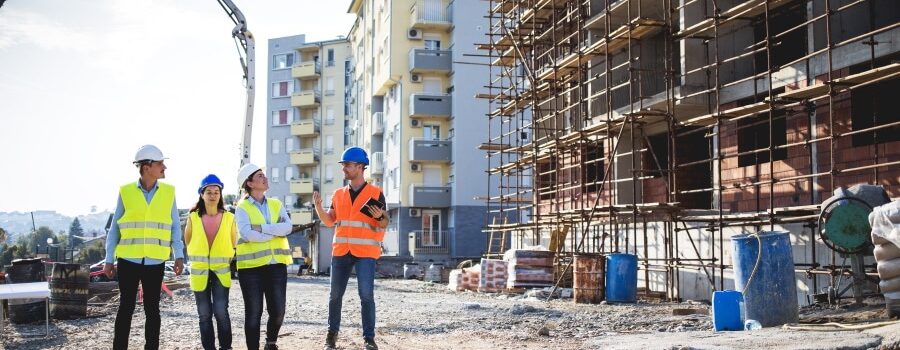Construction Site Clean-up Is Easy With Commercial Dumpster Rentals
There are many aspects to a commercial construction project, and many different teams are involved in the structure that’s being built or renovated. General contractors, roofers, window installers, concrete workers, and painters are just a few of the players in a typical commercial construction project. All these teams play by their own rules, but there’s one thing they have in common: they all contribute to the mess that has to be cleaned up once the work is finished.
Supplying the jobsite with a commercial roll-off container rental is one of the easiest ways to stay on top of this monumental task. Also known as a commercial dumpster rental, Kansas City construction jobs go more smoothly when there’s a receptacle on-site built to handle the trash and debris that accumulate during commercial construction or renovation. Small Haul KC specializes in right-sized dumpster rental in Overland Park and throughout the Kansas City metro area. We’ll help you keep the jobsite safe and tidy throughout the project.
What Can Be Tossed in a Commercial Dumpster?
Many people assume that you can toss anything into a commercial dumpster with no problems, but that’s not always the case. Just as there are rules about items that can be recycled in your home, there are also guidelines to follow when using a commercial dumpster. Here’s a quick run-down of what you can get rid of in a dumpster.
Roofing shingles. Asphalt shingles can be tossed in a commercial dumpster during a roof replacement job. It’s important to remember, however, that shingles are thin and lay flat in the dumpster. This can be deceiving. It means you can dump a lot of shingles in the container before you pause to think about weight limits. It’s budget-critical to take this into consideration when reserving your commercial dumpster rental in Kansas City. You’ll need to estimate the number of roofing layers that need to come off the building and calculate the approximate weight to ensure that you’re reserving the right-sized container for your needs. If not, you may end up paying additional fees to get rid of your overweight load.
Other roofing materials. Other roofing materials can also be disposed of in a commercial dumpster. Metal roofing, clay tiles, and slate shingles can all be tossed in the dumpster. Make sure you know whether these materials can be mixed with other debris or whether they have to be kept separate. In the case of metal roofing, most of the material is recyclable, which means you’ll want to keep it separated from other debris.
Building debris. Heavy debris such as brick, stone, and concrete can also be dumped into a commercial roll-away container. This refuse is much bulkier and doesn’t lay flat as asphalt shingles do, so you may need more than one dumpster or multiple loads if you’re working on a large construction project. On the flip side, it’s easier to monitor the weight of the container with bulky debris, unlike asphalt shingles.
Renovation debris. Other trash associated with commercial renovation projects – things like damaged or broken drywall, wood, metal, old windows, or other debris – can also be disposed of in a commercial dumpster.
Is There Anything That Shouldn’t Go in a Dumpster?
There are a few items that should never be disposed of in a commercial roll-off container. Here’s a list of the most common:
Paint, lacquer, or thinner. Paint, stain, lacquer, and paint thinner should not be disposed of in commercial dumpsters. Latex paint is the exception to the rule. If you must throw out latex paint, let it dry in a pan of kitty litter before tossing it into the dumpster.
Oils and other hazardous or flammable liquids. These are also a no-no for commercial containers. Call a professional waste management company for help getting rid of these items safely.
Tires. Many landfills are filled with old rubber tires that will never break down. If you have tires to dispose of, find a local recycler who will convert them to another form of usable rubber, such as playground material.
Asbestos. Asbestos is a highly toxic material that’s still found on many renovation jobsites. Asbestos-laden dust may put workers and the public in danger if not handled properly. A professional asbestos abatement contractor will help you safely rid the jobsite of any asbestos-containing materials. Do not toss them in the dumpster.
Batteries and electronics. While most commercial construction sites don’t have to worry about electronics and battery disposal – also called e-waste – they may occasionally have cause to dispose of these items when working on a renovation project. While it may seem simple to toss them in the dumpster along with the other trash, batteries and electronics need to be handled differently. Electronics may become a fire hazard, and batteries can leak toxic chemicals that could harm others. Dispose of these items responsibly by contacting an e-waste recycler.
Sealed tanks and drums. Sealed tanks and drums may be under pressure, or their contents, if any, may be combustible, making them a danger. Dispose of these items separately.
If you have questions about what may and may not be tossed in a commercial dumpster, give Small Haul KC a call. We’ll help you determine the best method of disposal for those items not allowed in commercial containers.
Commercial Dumpster Rental in Overland Park and Kansas City
Small Haul KC has the right-sized dumpster for your commercial project needs. We offer several sizes of commercial dumpster rentals. The largest is 20 cubic yards with a weight limit of two tons. The smallest commercial container is six cubic yards with a weight limit of one ton. We also offer several sizes in between. We make commercial dumpster rental easy for Kansas City contractors. Reserve one online, by phone, or by text.
For questions about commercial roll-off container rental with Small Haul KC, contact us at 913-991-1595 or through our website. We’re here to help!





